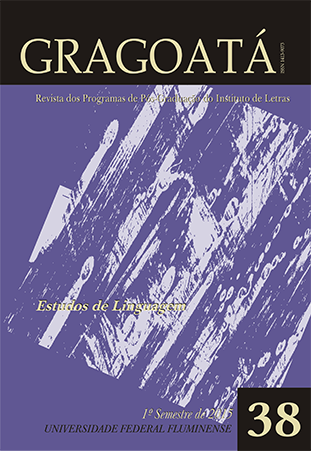MOVIMENTOS RETÓRICOS EM PRODUÇÕES ESCRITAS NO EXAME CELPE-BRAS
DOI:
https://doi.org/10.22409/gragoata.v20i38.33310Palabras clave:
Proficiência, Português Língua EstrangeiraResumen
Este artigo visa a apresentar resultado de pesquisa em que se investigou a execução de uma tarefa específica por meio da qual examinandos que prestaram o Celpe-Bras foram levados a comprovar seu nível de proficiência na variante brasileira da língua portuguesa. Com base na teoria de Swales (1994, 1998) e na concepção de gênero como ação social, tal como propôs Bazerman (1994, 2005), foram analisadas 35 cartas do leitor produzidas pelos examinandos da segunda aplicação do exame Celpe-Bras no ano de 2008. Ao realizarem a tarefa IV que consistia em ler uma reportagem da revista “Istoé” e escrever um texto para ser publicado na seção de cartas do leitor da mesma revista, verificou-se diversidade de modos de produção discursiva. discursiva. Com a finalidade de avaliar a qualidade da produção escrita, foram analisados os movimentos retóricos de cada um dos textos produzidos e verificou-se o nível de conhecimento linguístico discursivo desses examinandos. Constatou-se que, na seção de contato, os examinandos optaram por diferentes formas de abertura em que se observa variedade de níveis de formalidade. No núcleo da carta, muitos optaram pela contextualização seguida de questionamento dos argumentos apresentados e da apresentação de ponto de vista favorável ao uso do telefone celular, em diferentes níveis de proficiência, mas houve uma preocupação geral em todas as cartas do nosso corpus em atender ao comando do enunciado da tarefa. Entretanto, na seção de fechamento, verificou-se que em 15 cartas os examinandos finalizaram com o encerramento, sem o desfecho. Dessas, constatamos que apenas em nove cartas cabia esse procedimento discursivo. Finalmente, em 20 cartas consta encerramento seguido de desfecho. Praticamente todas apresentaram problemas de coerência discursiva, tendo sido empregados diferentes níveis de formalidade entre a abertura e o desfecho. Em poucas cartas verificamos coerência entre os três movimentos retóricos, ou três seções (contato, núcleo e fechamento).
Descargas
Descargas
Publicado
Número
Sección
Licencia
AUTORIZAÇÃO
Autores que publicam em Gragoatá concordam com os seguintes termos:
Os autores mantêm os direitos e cedem à revista o direito à primeira publicação, simultaneamente submetido a uma licença Creative Commons Atribuição 4.0 Internacional (CC BY 4.0), que permite o compartilhamento por terceiros com a devida menção ao autor e à primeira publicação pela Gragoatá.
Os autores podem entrar em acordos contratuais adicionais e separados para a distribuição não exclusiva da versão publicada da obra (por exemplo, postá-la em um repositório institucional ou publicá-la em um livro), com o reconhecimento de sua publicação inicial na Gragoatá.
A Gragoatá utiliza uma Licença Creative Commons - Atribuição CC BY 4.0 Internacional.











